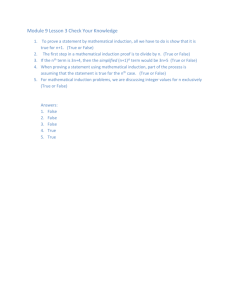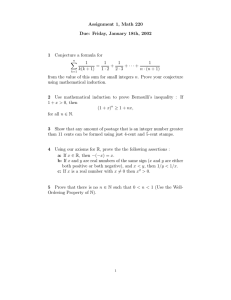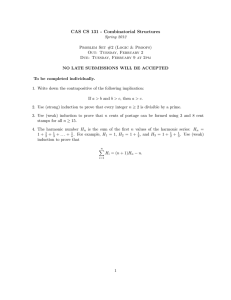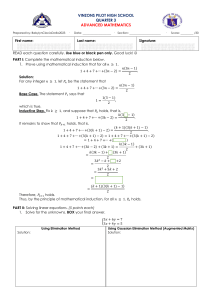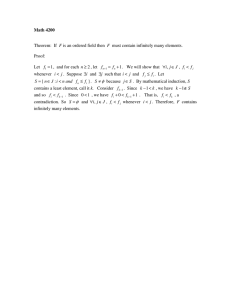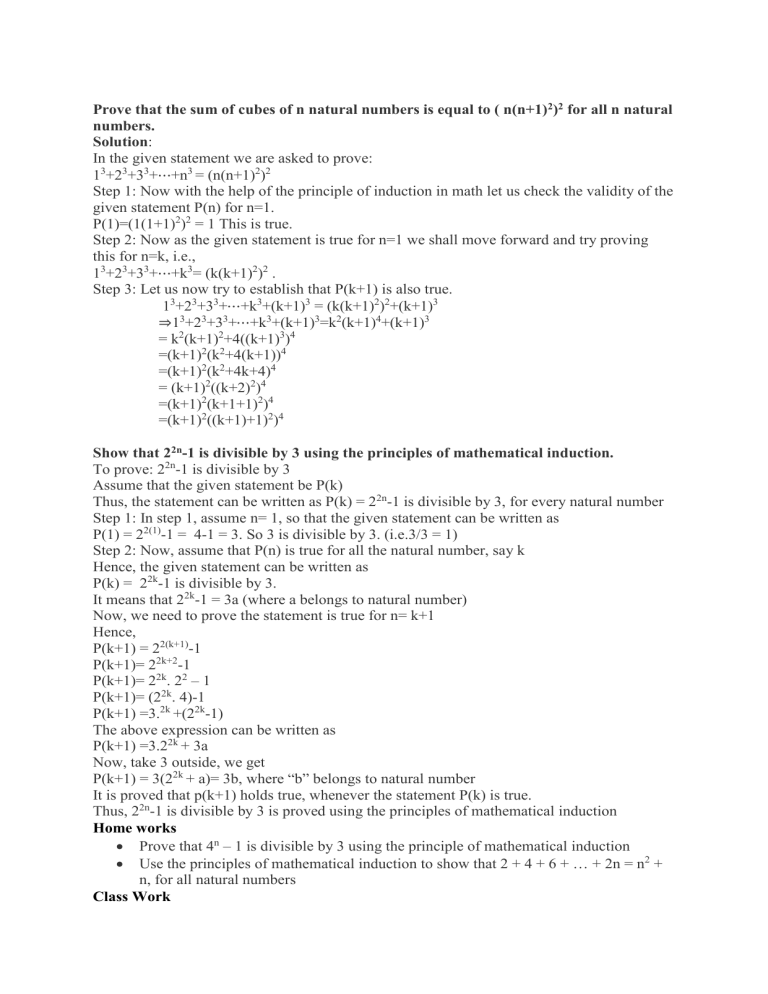
Prove that the sum of cubes of n natural numbers is equal to ( n(n+1)2)2 for all n natural
numbers.
Solution:
In the given statement we are asked to prove:
13+23+33+⋯+n3 = (n(n+1)2)2
Step 1: Now with the help of the principle of induction in math let us check the validity of the
given statement P(n) for n=1.
P(1)=(1(1+1)2)2 = 1 This is true.
Step 2: Now as the given statement is true for n=1 we shall move forward and try proving
this for n=k, i.e.,
13+23+33+⋯+k3= (k(k+1)2)2 .
Step 3: Let us now try to establish that P(k+1) is also true.
13+23+33+⋯+k3+(k+1)3 = (k(k+1)2)2+(k+1)3
⇒13+23+33+⋯+k3+(k+1)3=k2(k+1)4+(k+1)3
= k2(k+1)2+4((k+1)3)4
=(k+1)2(k2+4(k+1))4
=(k+1)2(k2+4k+4)4
= (k+1)2((k+2)2)4
=(k+1)2(k+1+1)2)4
=(k+1)2((k+1)+1)2)4
Show that 22n-1 is divisible by 3 using the principles of mathematical induction.
To prove: 22n-1 is divisible by 3
Assume that the given statement be P(k)
Thus, the statement can be written as P(k) = 22n-1 is divisible by 3, for every natural number
Step 1: In step 1, assume n= 1, so that the given statement can be written as
P(1) = 22(1)-1 = 4-1 = 3. So 3 is divisible by 3. (i.e.3/3 = 1)
Step 2: Now, assume that P(n) is true for all the natural number, say k
Hence, the given statement can be written as
P(k) = 22k-1 is divisible by 3.
It means that 22k-1 = 3a (where a belongs to natural number)
Now, we need to prove the statement is true for n= k+1
Hence,
P(k+1) = 22(k+1)-1
P(k+1)= 22k+2-1
P(k+1)= 22k. 22 – 1
P(k+1)= (22k. 4)-1
P(k+1) =3.2k +(22k-1)
The above expression can be written as
P(k+1) =3.22k + 3a
Now, take 3 outside, we get
P(k+1) = 3(22k + a)= 3b, where “b” belongs to natural number
It is proved that p(k+1) holds true, whenever the statement P(k) is true.
Thus, 22n-1 is divisible by 3 is proved using the principles of mathematical induction
Home works
Prove that 4n – 1 is divisible by 3 using the principle of mathematical induction
Use the principles of mathematical induction to show that 2 + 4 + 6 + … + 2n = n2 +
n, for all natural numbers
Class Work
Prove that 3n−1 is a multiple of 2?
1. Show it is true for n=1 31−1 = 3−1 = 2
Yes 2 is a multiple of 2 31−1 is true
2. Assume it is true for n=k 3k−1 is true
Now, prove that 3k+1−1 is a multiple of 2
3k+1 is also 3×3k
And then split 3× into 2× and 1×
And each of these are multiples of 2
Because:
2×3k is a multiple of 2 (we are multiplying by 2)
3k−1 is true (we said that in the assumption above)
So: 3k+1−1 is true
Using the principle of mathematical induction, prove that n(n + 1)(n + 5) is a multiple of
3 for all n ∈ N.
Solution:
Let P(n): n(n + 1)(n + 5) is a multiple of 3.
For n = 1, the given expression becomes (1 × 2 × 6) = 12, which is a multiple of 3.
So, the given statement is true for n = 1, i.e. P(1) is true.
Let P(k) be true. Then,
P(k): k(k + 1)(k + 5) is a multiple of 3
⇒ K(k + 1)(k + 5) = 3m for some natural number m, ... (i)
Now, (k + 1l)(k + 2)(k + 6) = (k + 1)(k + 2)k + 6(k + 1)(k + 2)
= k(k + 1)(k + 2) + 6(k + 1)(k + 2)
= k(k + 1)(k + 5 – 3) + 6(k + 1)(k + 2)
= k(k + 1)(k + 5) – 3k(k + 1) + 6(k + 1)(k + 2)
= k(k + 1)(k + 5) + 3(k + 1)(k +4) [on simplification]
= 3m + 3(k + 1 )(k + 4) [using (i)]
= 3[m + (k + 1)(k + 4)], which is a multiple of 3
⇒ P(k + 1): (k + 1 )(k + 2)(k + 6) is a multiple of 3
⇒ P(k + 1) is true, whenever P(k) is true.
Thus, P(1) is true and P(k + 1) is true, whenever P(k) is true.
Hence, by the principle of mathematical induction, P(n) is true for all n ∈ N.
Using the principle of mathematical induction, prove that (n² + n) is even for all n ∈ N.
Solution:
Let P(n): (n² + n) is even.
For n = 1, the given expression becomes (1² + 1) = 2, which is even.
So, the given statement is true for n = 1, i.e., P(1)is true.
Let P(k) be true. Then,
P(k): (k² + k) is even
⇒ (k² + k) = 2m for some natural number m. ... (i)
Now, (k + 1)² + (k + 1) = k² + 3k + 2
= (k² + k) + 2(k + 1)
= 2m + 2(k + 1) [using (i)]
= 2[m + (k + 1)], which is clearly even.
Therefore, P(k + 1): (k + 1)² + (k + 1) is even
⇒ P(k + 1) is true, whenever P(k) is true.
Thus, P(1) is true and P(k + 1) is true, whenever P(k) is true.
Hence, by the principle of mathematical induction, P(n)is true for all n ∈ N.
Using the principle of mathematical induction, prove that
(1 + x)n ≥ (1 + nx)for all n ∈ N,where x > - 1.
Solution:
Let P(n): (1 + x) )n ≥ (1 + nx).
For n = 1, we have LHS = (1 + x) )1 = (1 + x),and
RHS = (1 + 1 ∙ x) = (1 + x).
Therefore LHS ≥ RHS is true.
Thus, P(1) is true.
Let P(k) is true. Then,
P(k): (1 + X)k ≥ (1 + kx). …….. (i)
Now,(1 + x)k + 1 = (1 + x)k (1 + x)
≥ (1 + kx)(1 + x) [using (i)]
=1 + (k + 1)x + kx2
≥ 1 + (k + 1)x + x [Since kx2 ≥ 0]
Therefore P(k + 1): (1 + x)k + 1 ≥ 1 + (k + 1)x
⇒ P(k +1) is true, whenever P(k) is true.
Thus, P(1) is true and P(k + 1) is true, whenever P(k) is true. Hence, by the principle of
mathematical induction, P(n) is true for all n ∈ N.
Using the principle of mathematical induction, prove that n < 2n for all n ∈ N.
Solution:
Let P(n): n <2n.
When n = 1, LHS = 1 and RHS = 21 = 2.
Clearly, 1 < 2.
Thus, P(n) is true for n = 1, i.e., P(1) is true.
Let P(1) be true. Then,
P(k): k < 2k.
Now, k < 2k ⇒ 2k < 2k + 1
⇒ (k + k) < 2k + 1
⇒ (k + 1) ≤ (k + k) < 2k + 1 [Since 1 ≤ k]
⇒ (k + 1) < 2k + 1
Therefore P(k + 1): (k + 1) < 2k + 1
⇒ P(k + 1) is true, whenever P(k) is true.
Thus, P(1) is true and P(k + 1) is true, whenever P(k) is true.
Hence, by the principle of mathematical induction P(n) is true for all n ∈ N.
Using the principle of mathematical induction, prove that
(1² + 2² + …... + n²) > n³/3 for all values of n ∈ N.
Solution:
Let P(n): (1² + 2² + ….. + n²) > n³/3.
When = 1, LHS = 1² = 1 and RHS = 1³/3 = 1/3.
Since 1 > 1/3, it follows that P(1) is true.
Let P(k) be true. Then,
P(k): (1² + 2² + ….. + k²) > k³/3 .... (i)
Now, 1² + 2² + ..... + k² + (k + 1)²
= {1² + 2² + ..... + k² + (k + 1)²} + (k + 1)²
> k³/3 + (k + 1)² [using (i)]
= 1/3 ∙ (k³ + 3 + (k + 1)²) = 1/3 ∙ {k² + 3k² + 6k + 3}
= 1/3[k³ + 1 + 3k(k + 1) + (3k + 2)]
= 1/3 ∙ [(k + 1)³ + (3k + 2)]
> 1/3(k + 1)³
P(k + 1): 1² + 2² + ….... + k² + (k + 1) ² > 1/3 ∙ (k + 1)³.
P(k + 1) is true, whenever P(k) is true.
Thus P(1) is true and P(k + 1) is true whenever p(k) is true.
Hence, by the principle of mathematical induction, P(n) is true for all n ∈ N.
Using the principle of mathematical induction, prove that
(2n + 7) < (n + 3)² for all values of n ∈ N.
Solution:
Let P(n): (2n + 7) < (n + 3)²
When = 1, LHS = (2 × 1 + 7) = 9 and RHS = (1 + 3)² = 4² = 16.
Clearly, 9 < 16.
Thus, P(n) is true for n = 1, i.e., P(1) is true.
Let P(k) be true. Then
P(k): (2k + 7) < (k + 3)². ... (i)
Now, 2(k + 1) + 7 = (2k + 7) + 2
< (k + 3)² + 2 = (k² + 6k + 11) [using(i)]
< (k² + 8k + 16) = (k + 4)² = (k + 1 + 3)².
P(k + 1): 2(k + 1) + 7 < (k + 1 + 3)².
P(k + 1) is true, whenever P(k) is true.
Thus, P(1) is true and P(k + 1) is true, whenever P(k) is true.
Hence, by Principle of Mathematical Induction, P(n) is true for all n ∈ N.
